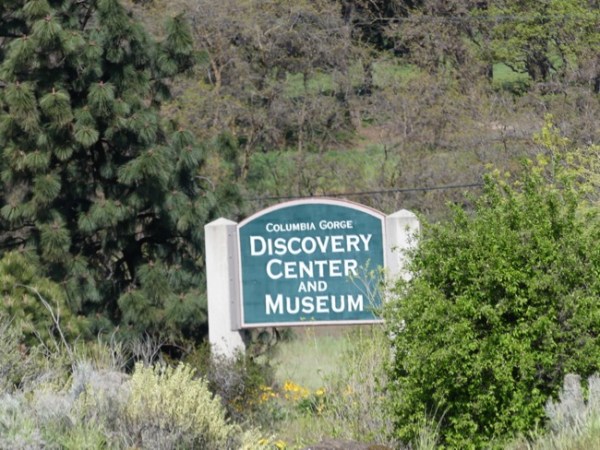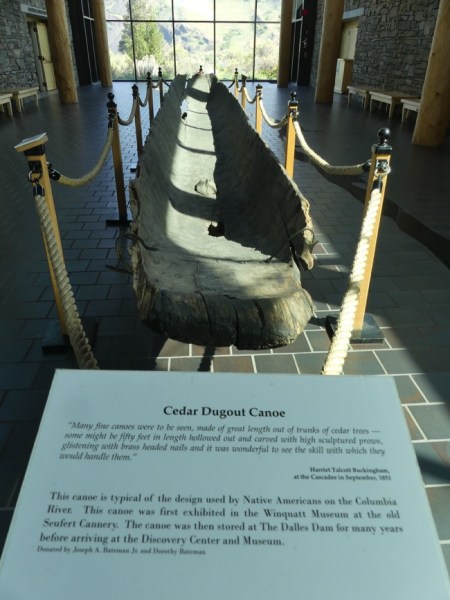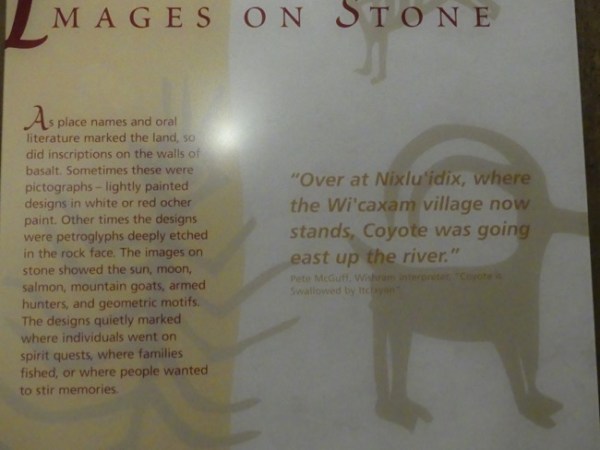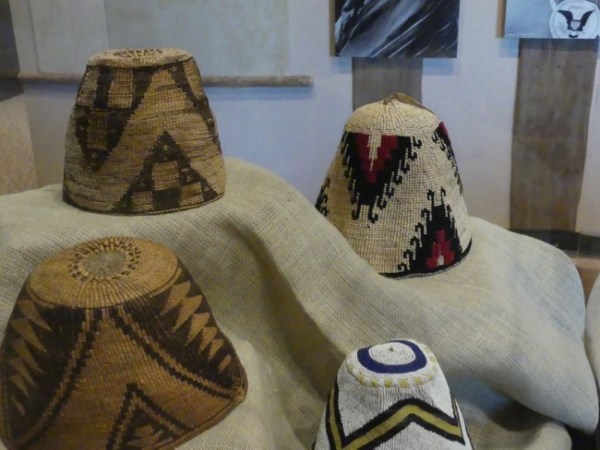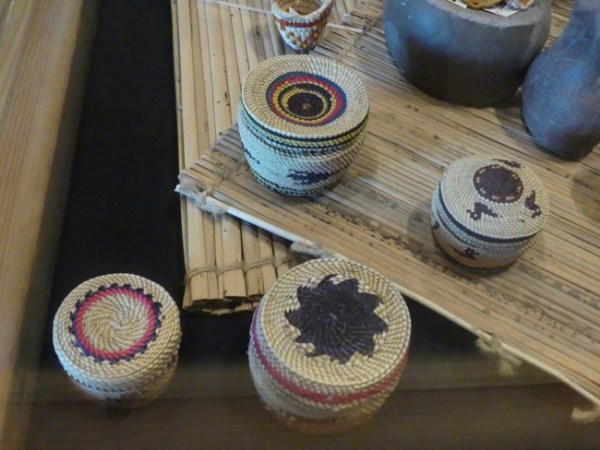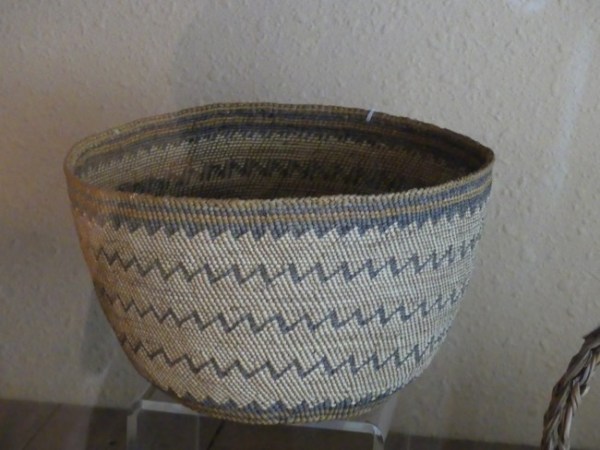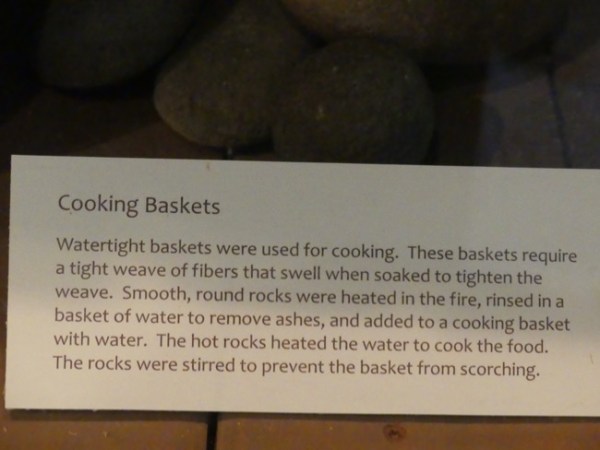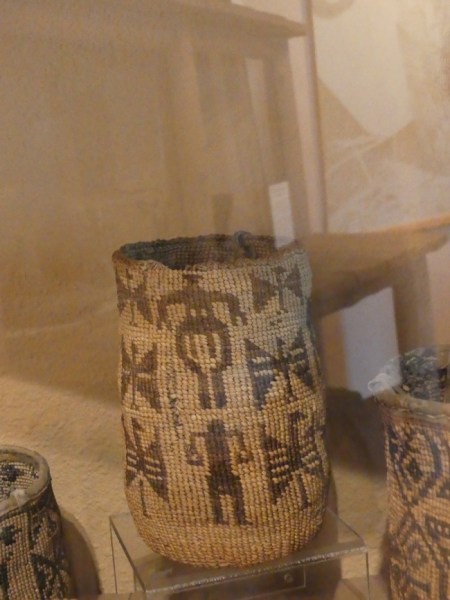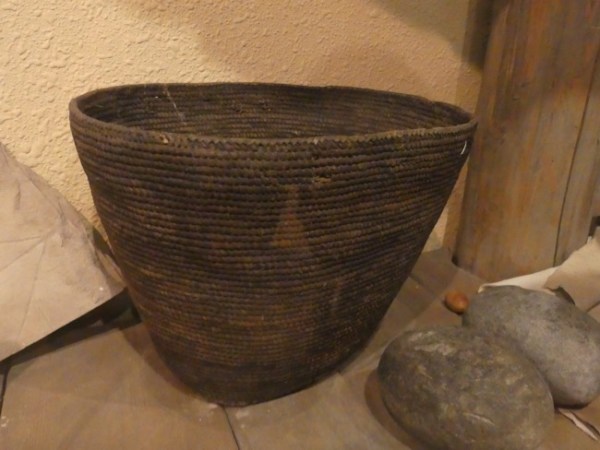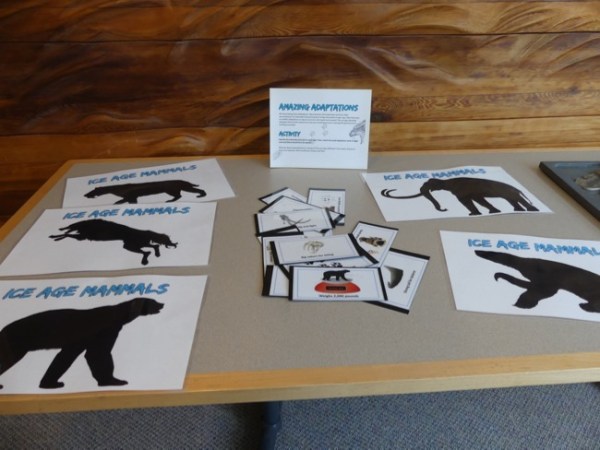Barcelona to Abu Dhabi: Dubai, Sharjah and More Adventure Than Anticipated
North from Muscat, through the Straits of Hormuz (where you see Khasab) and then south to Dubai.

We didn’t have a lot of expectations for the day. We were docking late in Dubai, just after lunch, and heading off almost immediately for Sharjah. We couldn’t really think why we were really going.
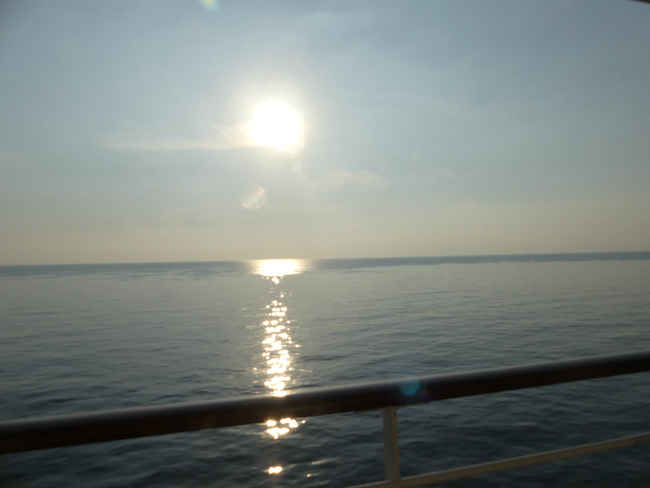
Packing to go home changes everything. You are no longer on a journey, you are already planning an end, it’s like the end of a love affair. AdventureMan and I sit down and calculate our tips. The tour requires that we prepay gratuities, and we did so, but there are people who contributed greatly to our happiness on board, and we need to encourage them in the most sincere way – cash.

So I spend my early morning time up in Horizons, drinking coffee, catching up on e-mails, and taking photos of the sunrise, which is shockingly dirty. The sun appears to be fighting its way through the smog and haze. And, oddly, the sun is rising on the port side of the ship, which would imply we are heading south, how can that be? I figure we must have passed the Straits of Hormuz and are now going south towards Dubai, it’s the only explanation I can think of. (See map above)

We hit breakfast – it’s taken about two weeks for us to settle back down, with all the variety and abundance offered, and we are now back to mostly eating with some discipline. I’ve not been as good with the blood sugar during the trip, but I’m back down to normal now and want to hold that line.
Our last trip to the spa, and once again, we have it all to ourselves, and then loll around for a while in the hot Gulf sunshine before showering – the spa is salt and showering is a must, as is drinking a lot of water to rehydrate. Lunch is just a little rushed, and then we are off to the Nautica Lounge where we run into Ed and Alan, and catch up on their happenings as we wait for our trips to be called. They are off to visit Dubai, while we are off to Sharjah.

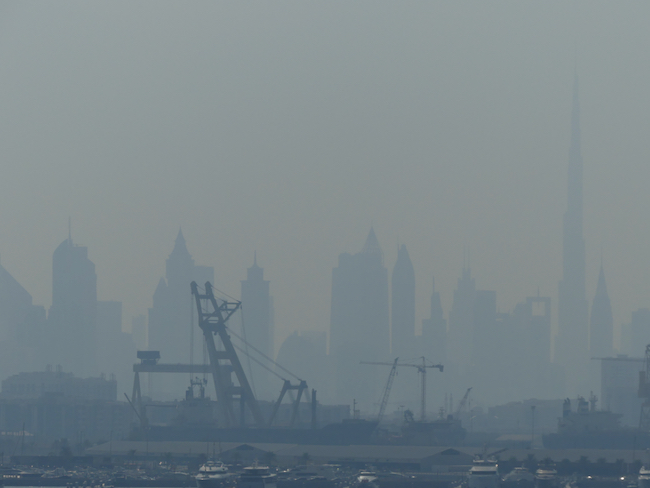
Below is the very modern, very efficient arrivals terminal and immigration.

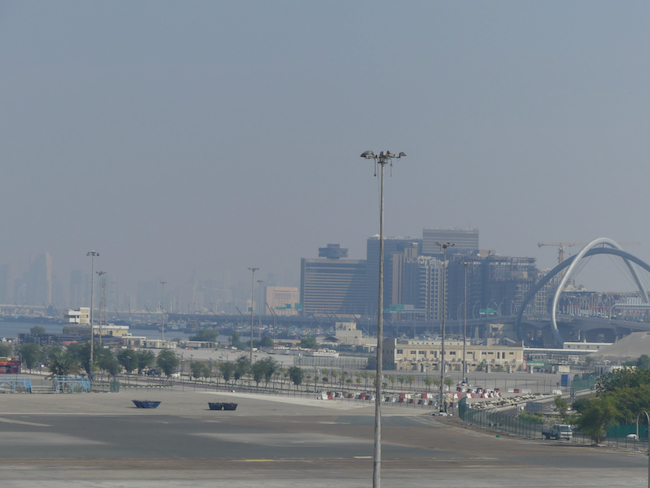
First, we have a great guide, an Iranian woman, with no headscarf, which she later explains – that the Quran says nothing about covering your hair or face, only to “cover your beauty.” She says that she covers sometimes, like for praying in the mosque, but she finds the abaya and headscarf are off-putting to her western tourist clients, and that people feel freer to ask her questions when she looks more like them. I found that to be compelling – that she believes in covering but that she also believes in eliminating barriers with her clients. I liked that she could hold those two ideas and make it work.
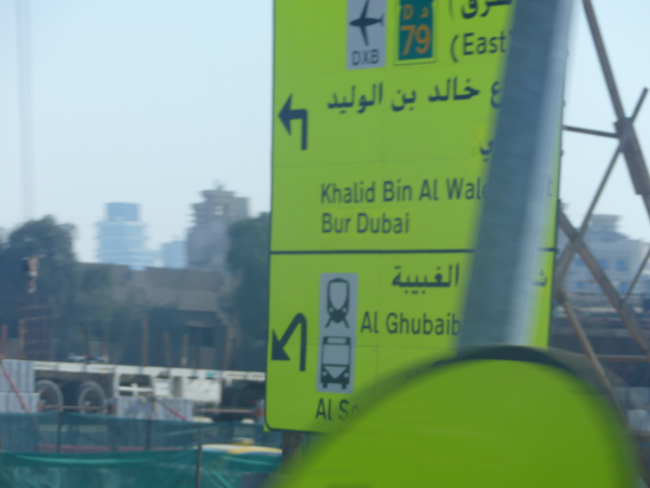


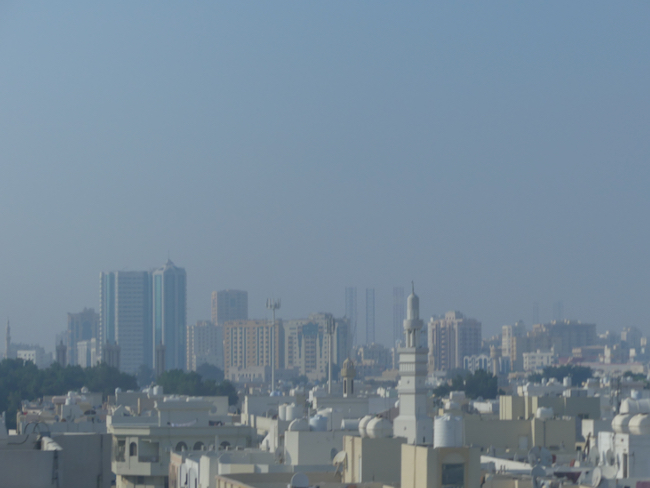

The trip was amazing. Sharjah is still quieter and somewhat less modern than Dubai and Abu Dhabi, although still built up in a more residential way. We started with a visual (in the bus) tour of a roundabout with beautiful official buildings – the court, the library, a mosque, surrounding a park, all very beautiful. Then we went to the Islamic Museum.



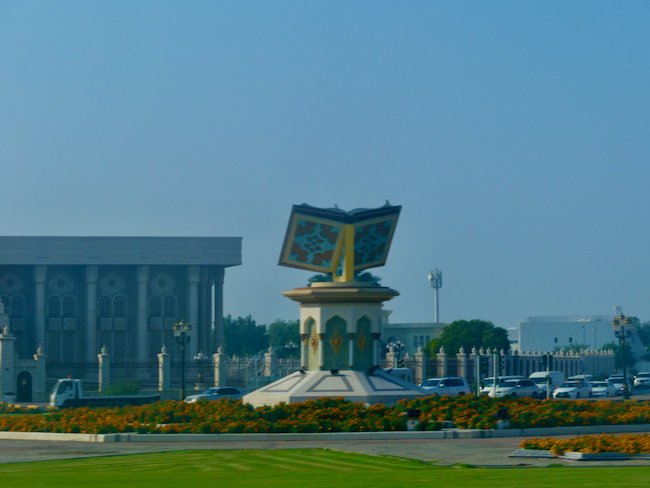




The Islamic Museum was impressive.


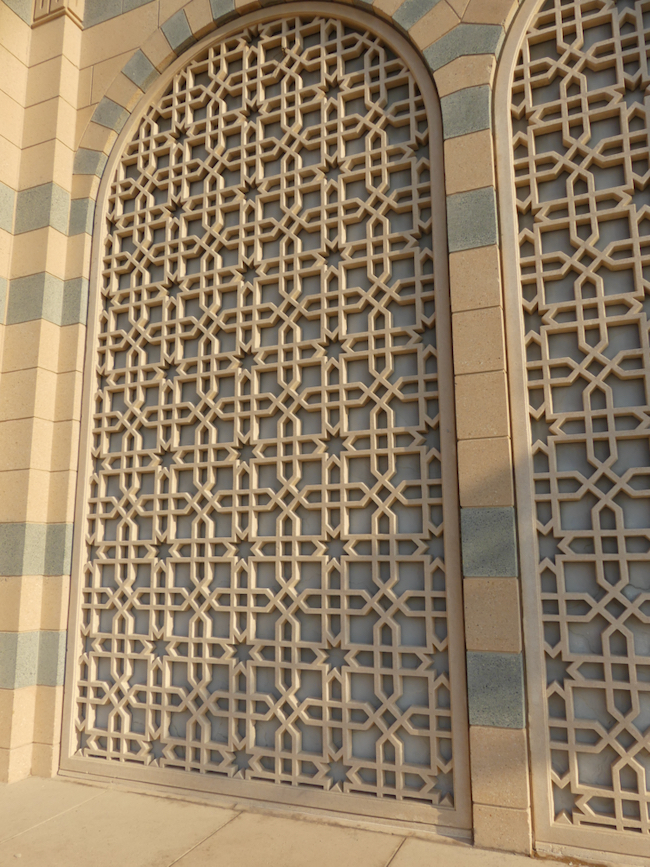

I leave the group; I zipped to the gift shop. It’s not that I am a rabid shopper, it’s that I do like to bring things back for people and I find the best quality at the best prices in museum shops. I found some wonderful things, very quickly, and moved on to a visiting Calligraphic exhibit, (I learned the glory of Islamic calligraphy at the Tarek Rejab Museum in Kuwait, a treasure trove of gorgeous Islamic scripts) and then I zipped up to visit the beautiful dome, gloriously painted with constellations and signs of the zodiac.



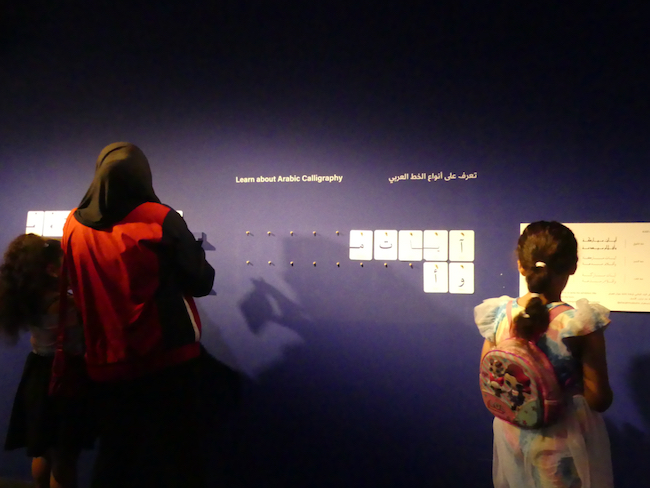



The dome crowns a beautiful reception room with comfortable chairs, and people looking up at this ceiling in wonder. It is beautiful.
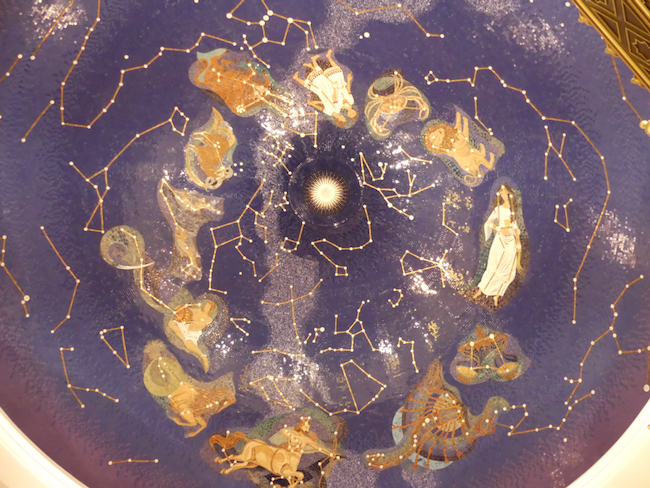
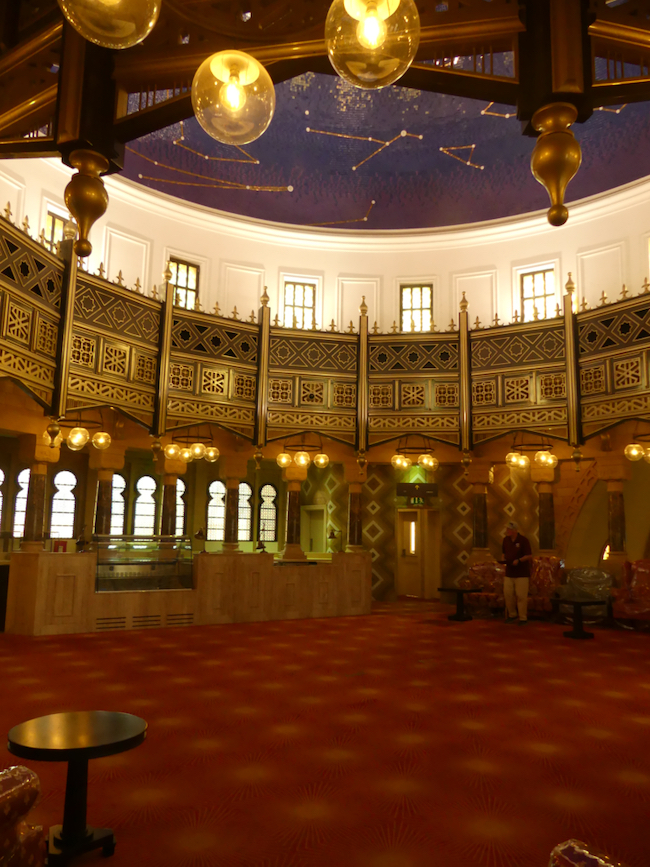
From there, I went to the section on Islamic technology, where I exalted in astrolabes and exquisite instruments of measurement – I love good design. It thrills my heart to see the gorgeous design of these instruments created to do practical work, but which thrill the user with their beauty.






As I am there, I get a call from AM reminding me our time is almost up and it is time to meet. Here is a thing about Oceania excursions – we never had a single one where were were held up by a lagger. On all our tour, people paid attention to time expectations and met – or even exceeded – the instructions.
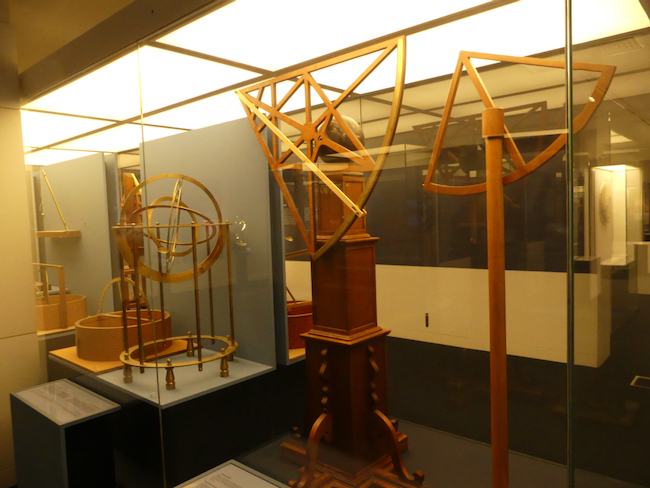

From the Islamic Museum, we headed to a fort, actually a re-creation of an actual fort which had been built on that exact spot. It had gorgeous pieces of ancient weaponry, guns, cannons, ammunition, suits of armor, and samples of early technology, such as goat skins used to store liquids, make yoghurt and butter. It was nearing sunset, and the late afternoon light loved the fort and it’s beautiful spaces.
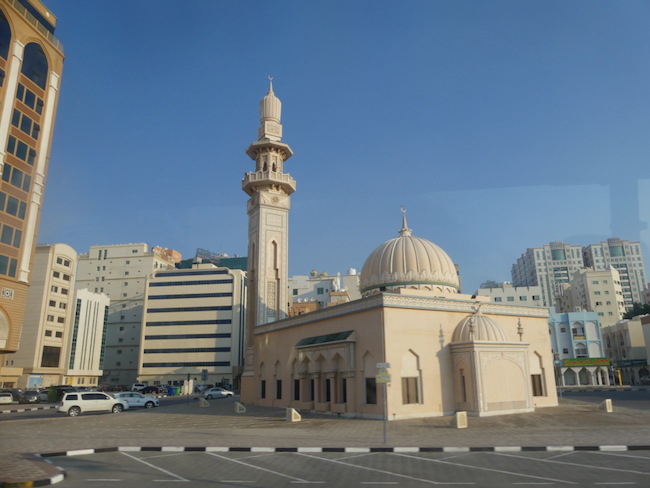


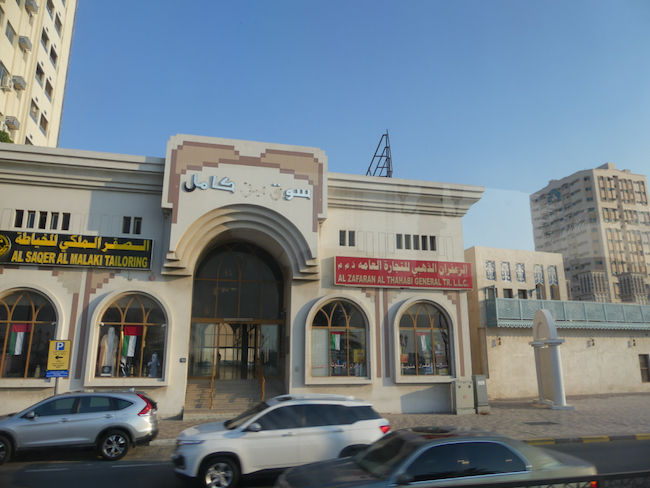


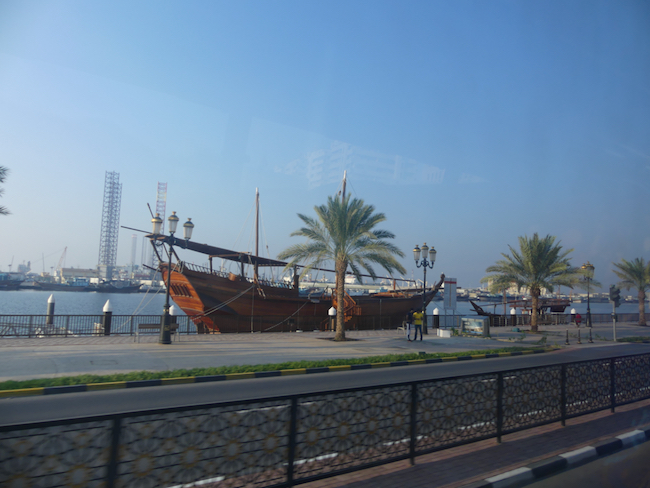


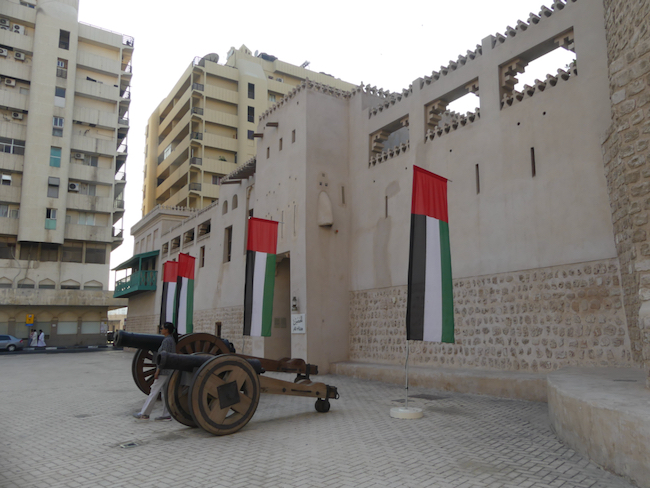
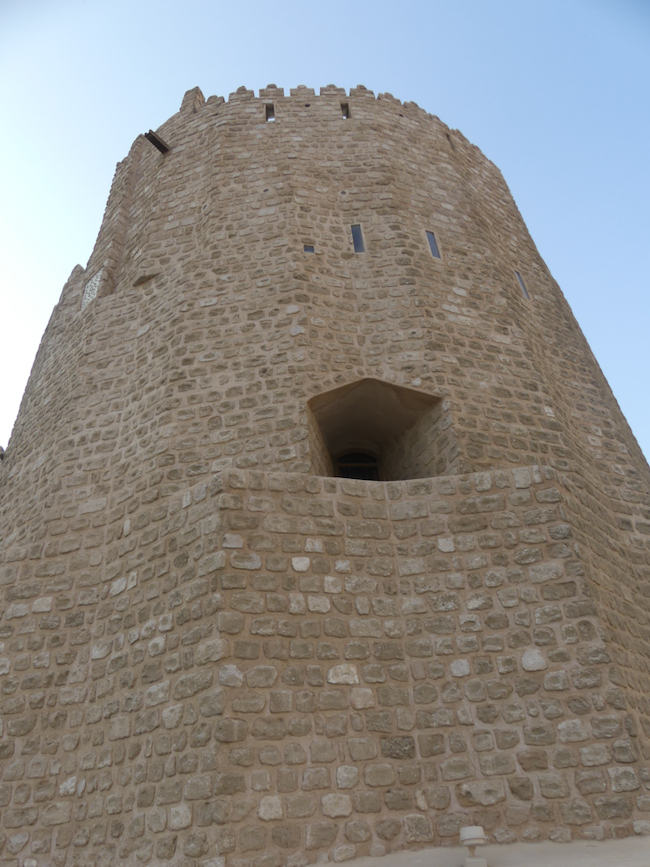


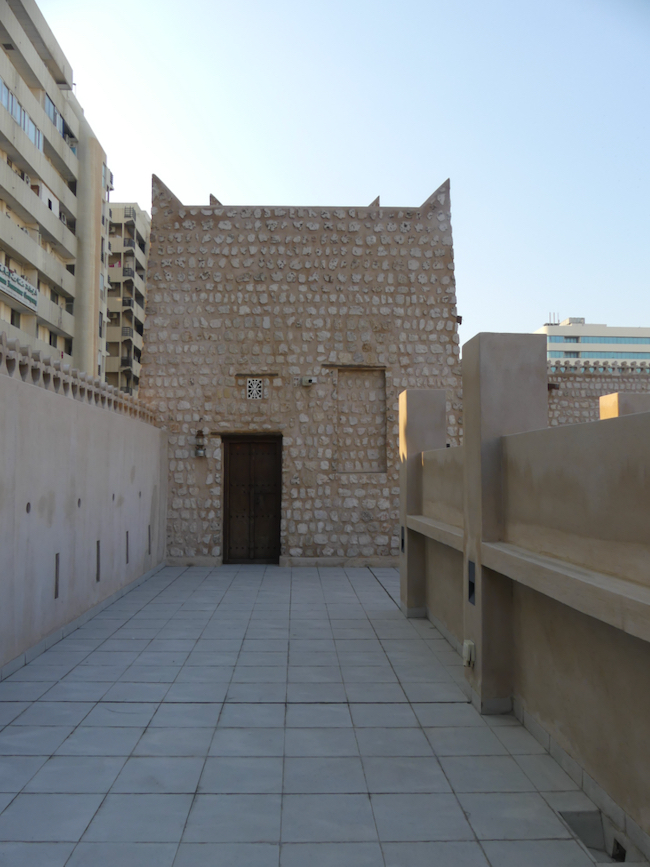
You will see a picture later of the original fort; this fort has been re-constructed in the middle of a busy city to honor the Sheikh and to honor earlier traditions in Sharjah. Below is looking down into the well in the fortress.



I found this display below a bit bizarre, but maybe that’s just me?






Below is an Omani chest, with the nail-head decoration. This chest is used as a closet, holding a simile of the Sheikh’s wardrobe.
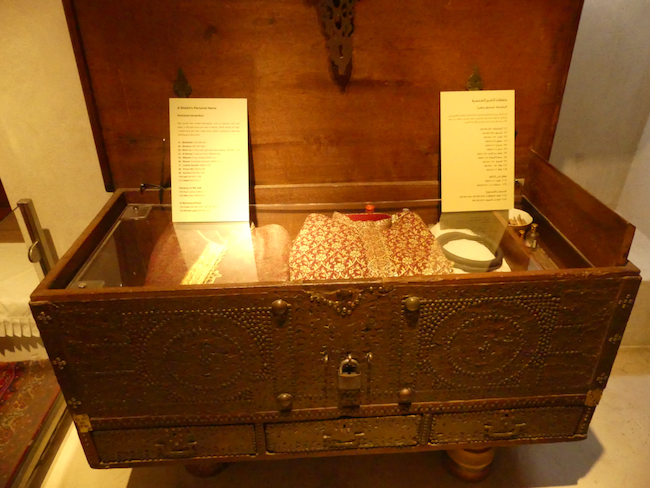



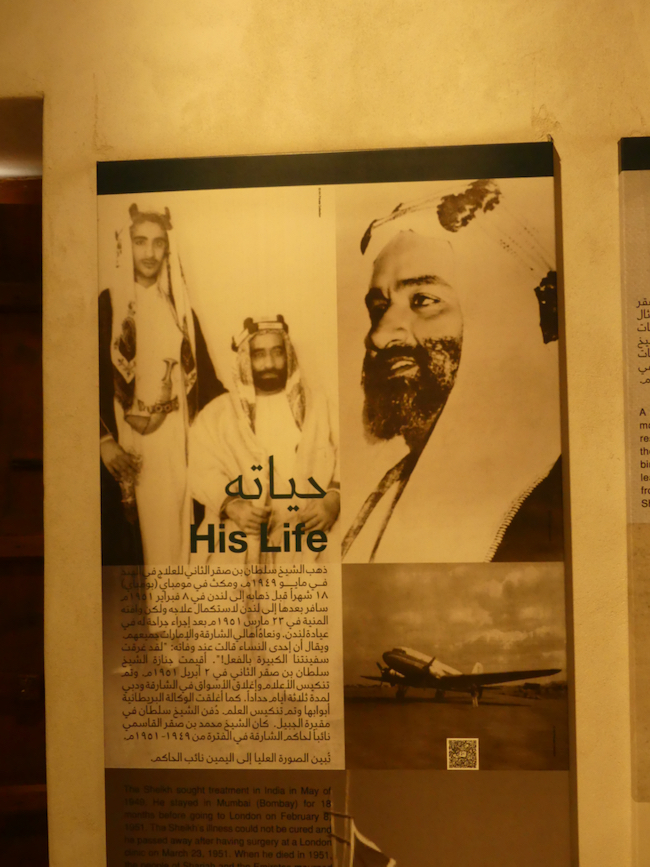

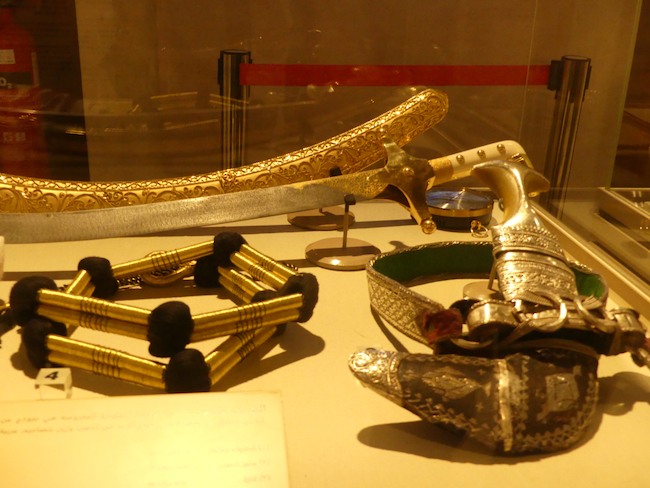




Another view of this modern apartment building; I would like to believe the snake-like figure is also calligraphic:


Last, we went to the Sharjah “souks.” We started off at the gold souks.

I like gold. I like real jewelry. The gold souks are overwhelming. Many of the shops are full of gold sets, the kind of gift a young bride is given by the groom’s family when she enters their family, a mail-like necklace/breastplate, and maybe earrings, a headpiece, sometimes handpieces, all matching, and all of which belong to her and provide her with some security in case down the line she is divorced or widowed. In theory, her bride price and her jewelry are hers to invest and manage. These sets are awesome to behold.

The sets are also intimidating. Maybe a movie-star could carry them off in our culture, but otherwise, they would draw too much attention. As we walk by shop after shop, I am dazzled and my heart beats faster, but when it comes to something for me, there is nothing. I remember how hard I had to look in places like Saudi Arabia, when gold was much cheaper, for pieces which were more modest and simple.
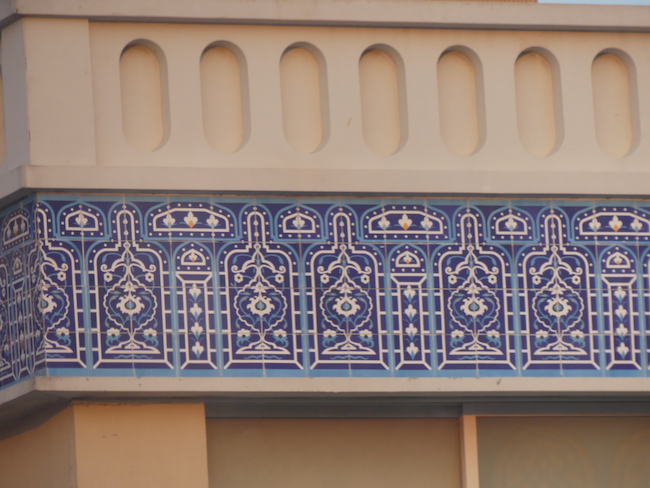
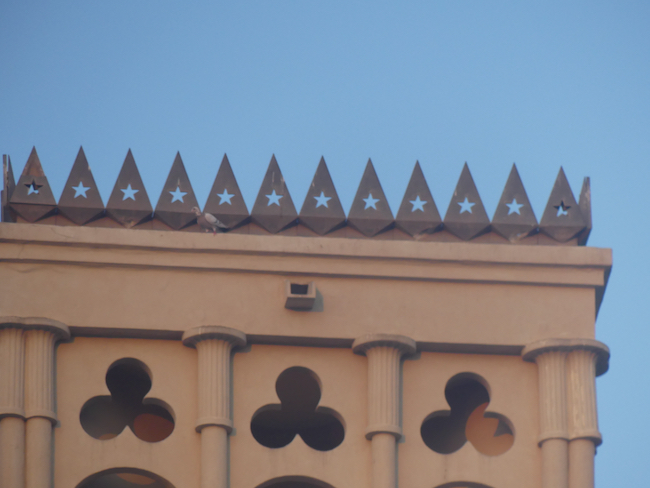





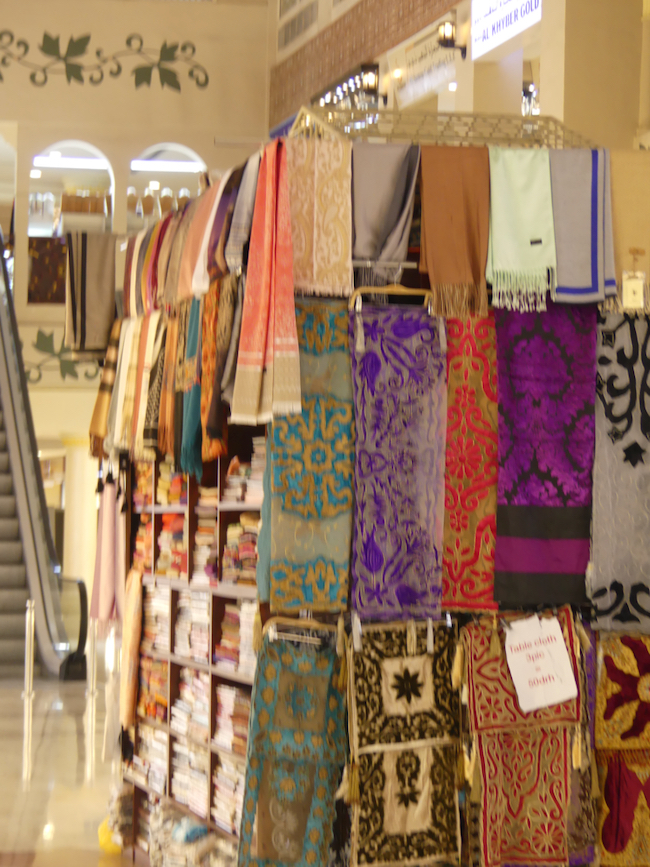
I buy nothing, except for at the end when AdventureMan and I have fresh-pressed juice; strawberry for him, and pomegranate for me. It is fresh juice, with no additives, and no sugar; there are pieces of fruit in the juice and it is delicious. These are times I really miss living in the Middle East.


As we are leaving, the sun has just gone down and the night has gone purple. It never fails to take my breath away. I only see this color in the Middle East, and it is just when the call to prayer begins to be called. Tonight there is a crescent moon. We are looking across the river at Dubai. The lights are twinkling, the call to prayer calls to our hearts, and families are gathering on woven mats to sit on the grass of the park across from the Mall. It is an exquisite time of the day and an experience of pure joy.
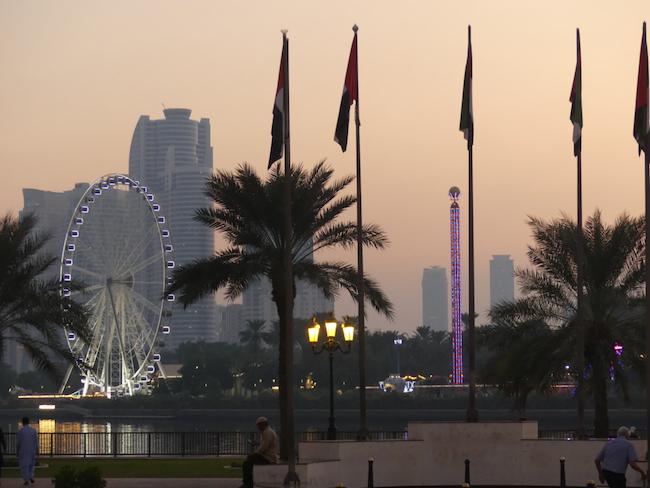
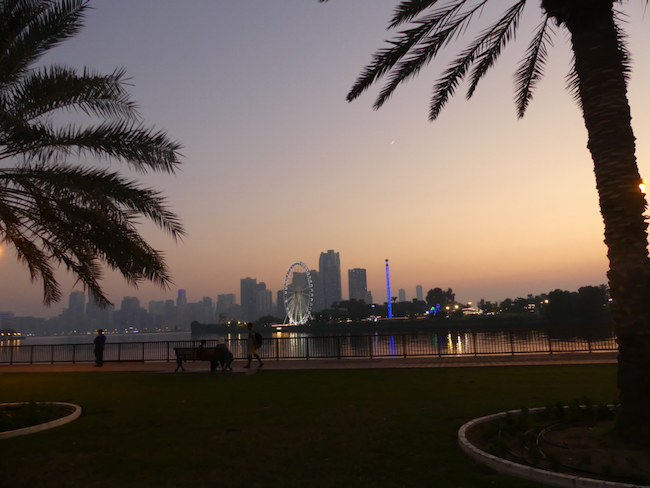
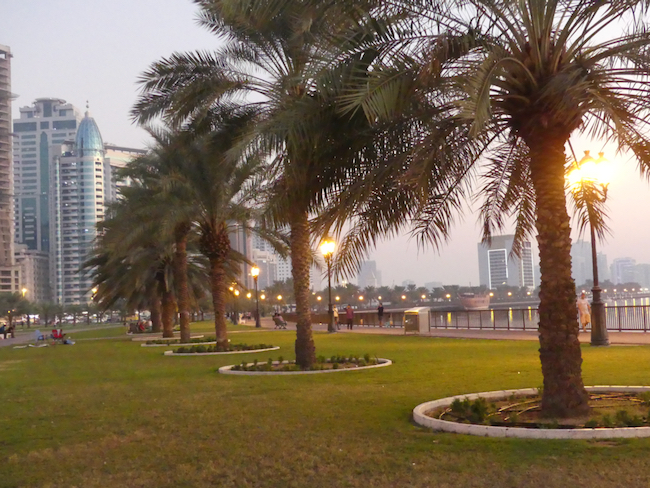


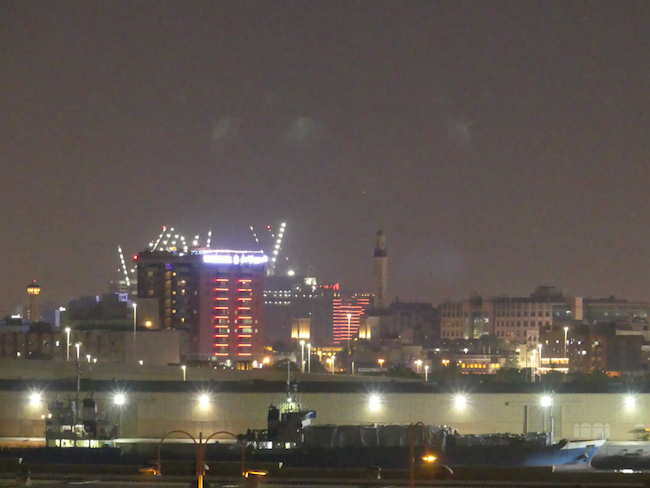
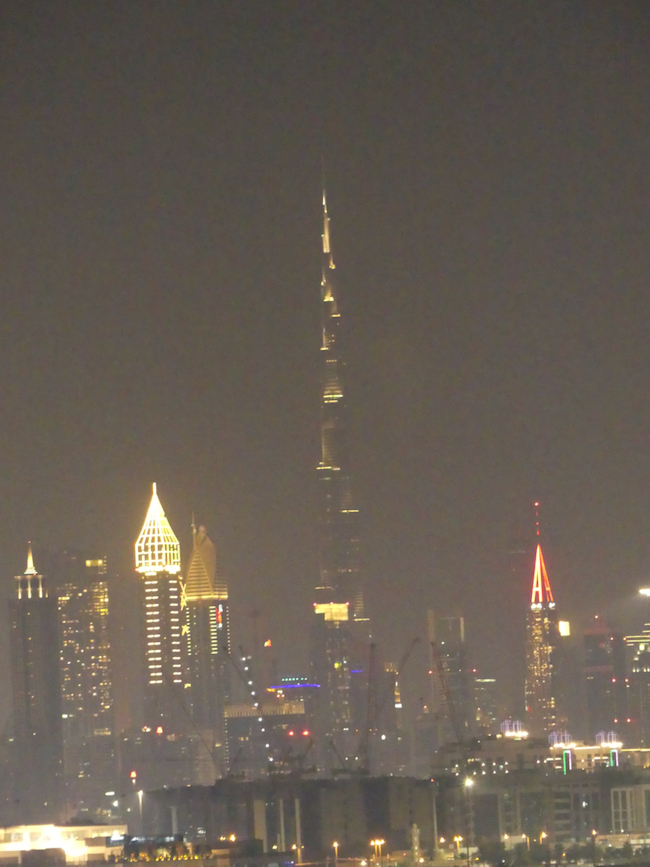
“So,” I can hear you asking, “The day is over. Where is the unanticipated adventure?”
Back at Nautica, we stand in line to pick up our passports for our departure the next day. I am handed my passport. AdventureMan’s passport is not there. The crew searches relentlessly, as we watch others easily access their passports. AdventureMan’s passport does not show up. It has not been returned by UAE Security. No one knows why.
We go through a bad couple of hours. I am trying to game what we will do if the problem is not resolved. This is an unusual circumstance, but this is the Middle East.
Security tells us his passport has been flagged because he was in Dubai in 2008 and they have no record of his exit. This is entirely possible. AdventureMan traveled a lot, in and out of many countries. Perhaps someone was talking with him as he departed and neglected to mark his departure. It’s all speculation. We really don’t know.
Finally, hours later, they relent, and an hour before the boat sails, his passport is returned by UAE officials.
We dine in our cabin, as we finish our packing. We need to have clothes for sleeping, clothes for disembarkation, and clothes for flying, including something warm for our transits through Brussels and Montreal. This entire trip has been a packing challenge, trying to anticipate temperature changes and comfortably appropriate clothing, including modesty requirements. Dinner is simple but relaxing, we finish off the wine we bought in Barcelona, and we jump up now and then to refine packing, make sure we have the appropriate paperwork, etc. We are greatly relieved to have AdventureMan’s passport back and we are also a little unnerved. We are hoping there will be no further problems as we leave Abu Dhabi.
We sleep well.
February 19, 2023 Posted by intlxpatr | Adventure, Arts & Handicrafts, Beauty, Bureaucracy, Cold Drinks, Cultural, ExPat Life, Geography / Maps, Public Art, Shopping, sunrise series, Sunsets, Survival, Travel, Work Related Issues | Emirates, Islamic Museum, Nautica, Oceania, Sharjah, souks | Leave a comment
Back in Kuwait
No, No don’t get excited. It’s a metaphor.
When I lived in Kuwait, I would tell my friends it was a lot like living in Alaska, and I loved the look on their faces. Then I would explain – in Alaska, people wait eagerly for good weather, and when it comes, they can’t get enough of it. We are outdoor people.
For much of the year, Alaskans are trapped inside, and have to be good at finding things to do to keep themselves from going crazy.
In Pensacola, as it was in Kuwait, the temperatures are very hot. Kuwait was mostly very dry, and had sandstorms, unlike Pensacola, but shared having a long coastline, and heat with humidity in the summers.
So now, as in Kuwait, I am up early, to get to the pool and swim my laps, so lovely and cool. If I need to grocery shop, I try to shop on the way home, so as not to have to venture out again as the day heats up. I get home, and tend to the Little Free Library while it is still in the shade. Most of the rest of the day I spend inside, except for picking up grandchildren at their camps.
It is a great time to do some quilting. I am just about to start when Ragnar, my helper, comes in to join me. (Also, AdventureMan is outside weed-eating and edging, which is of endless amusement and torment to Ragnar, who forgets he was once a feral, outdoor cat, and was lucky to survive.)
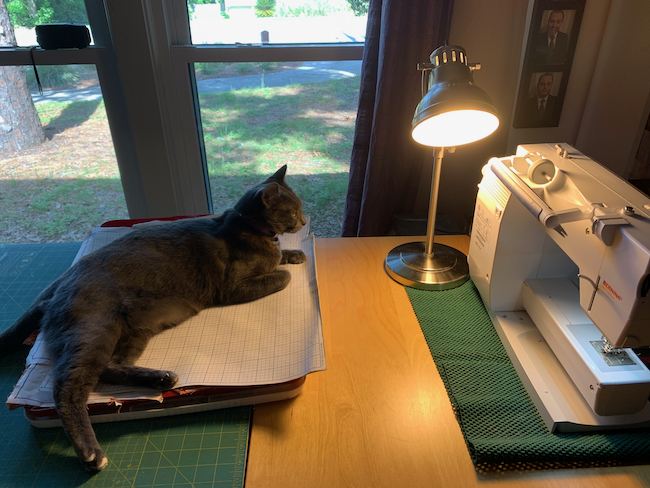
I do a couple more things to set up, hoping Ragnar will take the hint and move off to find something more interesting. He doesn’t. In the end, I have to lift him (lovingly) and place him in another room on a blanket we call Blue Mama, because Ragnar particularly loves sleeping on this blanket.
He doesn’t come back, and I spend the morning “back in Kuwait,” enjoying my confinement by working with fabrics and colors I love, patterns I would never wear but enjoy the challenge of working them into quilts.

June 16, 2022 Posted by intlxpatr | Arts & Handicrafts, Biography, Cultural, ExPat Life, Florida, Pensacola, Quality of Life Issues, Weather, Work Related Issues | Leave a comment
Going Postal

We have a great insurance company who sent us this notice this morning:

USAA is a government-friendly organization, providing insurance to people associated with the military. They have a first-class reputation.
It is a sad day when even government-friendly conservative organizations have to take notice of the disgusting failure of our current postal leadership.
As we were growing up, living in Alaska and in foreign countries, we had opportunities to compare our system to others. Americans put a priority on getting the mail delivered in a timely manner and at a reasonable cost. Other nations admired our efficiency, and our emphasis on the public service our postal system provided to the American people.
We need to get back to these very public-service-oriented values. The postal system is worth subsidizing to provide valuable services to citizens of the United States of America.
December 13, 2021 Posted by intlxpatr | Bureaucracy, Character, Civility, Community, Cultural, Customer Service, ExPat Life, Financial Issues, Interconnected, Leadership, Living Conditions, Political Issues, Quality of Life Issues, Social Issues, Values, Work Related Issues | Leave a comment
Into the Great Wide Open: Day 12, Jackson Hole to Bozeman through Idaho

I have a Swedish sausage with my breakfast, because of Swedish descent as I am, I have never had a Swedish sausage. I like the taste, but not the consistency, which is kind of loose and crumbly. Great coffee, great muesli and love those berries.

Gas leaving Jackson Hole is $3.99 a gallon at the cheapest station.
I take a photo of the motel we stayed more than forty years ago, just outside Jackson Hole, when we were traveling across the USA in our Volkswagon Bus en route to Monterey, CA for grad school and language school and knew we couldn’t afford to stay inside Jackson Hole. We were right across from the Elk reserve, and once we got our little baby to sleep, we sat outside and watched the enormous herd of elk as they munched and wandered. It isn’t so far outside Jackson Hole, now, and I am glad it is still there.


This is the second day where we experience haze. We drive up over the mountains into Idaho, and spend a couple hours on very rural highways sharing the road with large combines, harvesters and all kinds of farm equipment.






The scenery starts to change when we near Big Sky and the Gallatin River. Lunch was apples with peanut butter alongside a road with trucks whizzing by.

Once again, our hotel room is not ready. As we wait, another man gets the same response and also that he will not be on his requested floor. He is very angry, says he reserved a month ago (!) and wants to be accommodated. Later I ask the desk clerk if they are having problems with finding people to work and she says yes, that it is a problem everywhere in Bozeman. I suspect that they have closed off the top floor and are also limiting the number of people they can serve until they can guarantee the ability to take care of them.
I am thinking that this has a lot to do with demographics, and problems with finding good, reliable, safe child care, and finding jobs which will protect their workers and also provide benefits. We can see that many of the hotels are now offering health insurance and educational benefits to the people they hire. I am thinking the labor market has a little leverage, and they are using it to better their conditions.
And yes, that may inconvenience business owners and managers, and inconvenience customers, like us, but for the greater good, perhaps we can find a balance where everyone wins?
Our room is lovely, and quiet, and spacious.
We have reservations for dinner at Blacksmith Italian, a restaurant we both found intriguing. Bossy Lady totally screwed up getting us there, sometimes she doesn’t really know everything, but she got us close enough and we figured out the rest.
The minute we walked in, we knew we were in the right place. It was full of local people. The plates coming out looked very fine. The smells were delicious.
We split a platter of meats and cheeses; it was full of delicate tidbits, duck and Italian sausage and tiny pickled peppers filled with ricotta, etc. This came with crispy tasty triangular bread, a little salty, very tasty. AdventureMan had mussels and a side of pasta as his main course, and I had calamari with a Putenesca sauce and a side of pasta. The sauce was fabulous; I didn’t even need the calamari, the sauce was so engaging. The wines were equally good; I had a Barbera and AdventureMan has a Lacryma Cristi white wine which was so good, I ordered it the next night.





Yes. It was so good we reserved for the next night, too. It would be our last night in Bozeman, might as well end on a high note.
September 16, 2021 Posted by intlxpatr | Adventure, Cultural, Eating Out, Food, Geography / Maps, Living Conditions, Quality of Life Issues, Restaurant, Road Trips, Travel, Work Related Issues | Blacksmith Italian Restaurant, Bozeman, Idaho, Montana | Leave a comment
Florence Nightengale Made a Difference
Today, in addition to the readings from the Old Testament, New Testament and Gospels, the Lectionary celebrates Florence Nightingale. I had no idea how influential this woman-ahead-of-her-times was in making hospitals safer places in which to treat our wounded and sick. She observed, studied and documented sanitary practices and how changing small things – like changing the linens on beds between patients, clean latrines – could make a big difference. She brought order out of chaos, truly a Godly woman.
FLORENCE NIGHTINGALE
NURSE, RENEWER OF SOCIETY (12 AUGUST 1910)
 The commemoration of Florence Nightingale is controversial. On the one hand, she doubted or denied many of the central articles of the Creed. On the other hand, she believed in God and devoted her life to His service as she understood it.
The commemoration of Florence Nightingale is controversial. On the one hand, she doubted or denied many of the central articles of the Creed. On the other hand, she believed in God and devoted her life to His service as she understood it.
She was born in Florence on 12 May 1820 of upper-class English parents travelling through Italy, and named for her native city. (“Florence” was not an accepted first name at the time. Her sister was born in Naples and named “Parthenope,” the Greek name for that city.) Florence was reared in the Unitarian Church, but later joined the Church of England.
In her diary, an entry shortly before her seventeenth birthday reads: “On February 7th, 1837, God spoke to me and called me to his service.” She did not know what the service would be, and therefore decided that she must remain single, so as to have no encumbrances and be ready for anything. With this in mind, she rejected a proposal of marriage from a young man whom she dearly loved. She suffered from “trances” or “dreaming” spells, in which she would lose consciousness for several minutes or longer, and be unaware when she recovered that time had passed. (Could this be a form of petit mal epilepsy? No biographer of hers that I have read uses the word.) She found the knowledge that she was subject to such spells terrifying, and feared that they meant that she was unworthy of her calling, particularly since she did not hear the voice of God again for many years. In the spring of 1844 she came to believe that her calling was to nurse the sick. In 1850 her family sent her on a tour of Egypt for her health. Some extracts from her diary follow:
March 7. God called me in the morning and asked me would I do good for Him, for Him alone without the reputation.
March 9. During half an hour I had by myself in my cabin, settled the question with God.
April 1. Not able to go out but wished God to have it all His own way. I like Him to do exactly as He likes without even telling me the reason.
May 12. Today I am thirty–the age Christ began his mission.
Now no more childish things. No more love. No more marriage. Now Lord let me think only of Thy Will, what Thou willest me to do. Oh Lord Thy Will, Thy Will.
June 10. The Lord spoke to me; he said, Give five minutes every hour to the thought of Me. Coudst thou but love Me as Lizzie loves her husband, how happy wouldst thou be.” But Lizzie does not give five minutes every hour to the thought of her husband, she thinks of him every minute, spontaneously.
Florence decided that she must train to be a nurse. Her family was horrified. In her day, nursing was done mostly by disabled army veterans or by women with no other means of support. It was common for nurses of either sex to be drunk on the job most of the time, and they had no training at all. It was common practice never to wash or change the sheets on a bed, not even when a patient died and his bed was given to a new patient. Florence was told to go to Kaiserswerth, Germany, to learn and train with the Lutheran order of Deaconesses who were running a hospital there. Back in England again, she used the influence of Sidney Herbert, a family friend and Member of Parliament, to be appointed supervisor of a sanatorium in London. Under her able guidance, it turned from a chamber of horrors into a model hospital. The innovations introduced by Miss Nightingale were, for their day, little short of revolutionary. She demanded, and got, a system of dumb-waiters that enabled food to be sent directly to every floor, so that nurses did not exhaust themselves carrying trays up numerous flights of stairs. She also invented and had installed a system of call bells by which a patient could ring from his bed and the bell would sound in the corridor, with a valve attached to the bell which opened when the bell rang, and remained open so that the nurse could see who had rung. “Without a system of this kind,” she wrote, “a nurse is converted to a pair of legs.”
While working in the poorer districts of London, Miss Nightingale encountered a Roman Catholic priest, Henry Edward Manning (later Cardinal Manning), who was working among the poor of London. She was impressed by the assistance he gave to many who had nowhere else to turn, and they became friends for life. She was greatly attracted by Roman Catholicism, but rejected much of its theology, and so reluctantly decided against joining it.
 Then war broke out in the Crimea (in Russia, on the north edge of the Black Sea), and Sir Sidney Herbert, now Secretary of War, obtained permission for Florence to lead a group of 38 nurses there. Of these, 10 were Roman Catholic nuns, 14 were Anglican nuns, and the remaining 14 were “of no particular religion, unless one counts the worship of Bacchus.” They found conditions appalling. Blankets were rotting in warehouses while the men did without, because no one had issued the proper forms for their distribution. The lavatories in the hospitals had no running water, and the latrines were tubs to be emptied by hand. But no one emptied them, since official regulations did not specify which department was responsible for doing so. The result was that the hospital had a foul stench that could be smelled for some distance outside its walls. Far more men were dying in hospitals of infection than of wounds. The chief concern of many of the Army doctors was that the nurses might usurp some of their authority. Florence gradually managed to win the doctors and other authorities over, and to reform hospital procedures, with spectacular results. Once the medical situation had ceased to be an acute problem, she turned her attention to other aspects of the soldiers’ welfare. For example, most of them squandered all their pay on drink. She noted that there was no trustworthy way for them to send money home to their families, and she set up facilities for them to do so. First, she undertook to send money home herself for any soldier in the hospital that wanted it sent, and the soldiers brought in about 1000 pounds a month. She asked the authorities to set up an official service to do this, and they refused. By appealing to Queen Victoria herself, she overcame opposition to the idea, and the men sent home 71,000 pounds sterling in less than six months. She established with her own money a reading-room with tables for writing letters, and the men used it enthusiastically. She imported four schoolmasters to give lectures, and the halls were filled to overflowing. All this was done despite opposition from officers who said, “The men are hopeless brutes. You cannot expect anything from them.”
Then war broke out in the Crimea (in Russia, on the north edge of the Black Sea), and Sir Sidney Herbert, now Secretary of War, obtained permission for Florence to lead a group of 38 nurses there. Of these, 10 were Roman Catholic nuns, 14 were Anglican nuns, and the remaining 14 were “of no particular religion, unless one counts the worship of Bacchus.” They found conditions appalling. Blankets were rotting in warehouses while the men did without, because no one had issued the proper forms for their distribution. The lavatories in the hospitals had no running water, and the latrines were tubs to be emptied by hand. But no one emptied them, since official regulations did not specify which department was responsible for doing so. The result was that the hospital had a foul stench that could be smelled for some distance outside its walls. Far more men were dying in hospitals of infection than of wounds. The chief concern of many of the Army doctors was that the nurses might usurp some of their authority. Florence gradually managed to win the doctors and other authorities over, and to reform hospital procedures, with spectacular results. Once the medical situation had ceased to be an acute problem, she turned her attention to other aspects of the soldiers’ welfare. For example, most of them squandered all their pay on drink. She noted that there was no trustworthy way for them to send money home to their families, and she set up facilities for them to do so. First, she undertook to send money home herself for any soldier in the hospital that wanted it sent, and the soldiers brought in about 1000 pounds a month. She asked the authorities to set up an official service to do this, and they refused. By appealing to Queen Victoria herself, she overcame opposition to the idea, and the men sent home 71,000 pounds sterling in less than six months. She established with her own money a reading-room with tables for writing letters, and the men used it enthusiastically. She imported four schoolmasters to give lectures, and the halls were filled to overflowing. All this was done despite opposition from officers who said, “The men are hopeless brutes. You cannot expect anything from them.”
At night, she would often patrol the wards, carrying a dim lamp, to make sure that all was well and no one was in need of help. She became famous as “the Lady with the Lamp.”
 In April 1856 the war was over, and by mid-July the hospital was emptied and her work in Crimea over. She returned to England a national hero, with a great welcome prepared for her; but she slipped into the country unnoticed and went to a convent that had supplied some of her nurses. There, she spent the day in prayer before coming out to face the public and beginning to lobby Parliament for suitable legislation. She wrote pamphlet after pamphlet, pointing out by pie charts, for example, that the major cause of deaths in the Army was not wounds caused by enemy action but disease caused by lack of proper sanitation. She is perhaps the first person to use pie charts and similar graphic devices to convey statistical information. She obtained the formation of an Army Medical Staff Corps and a Sanitary Commission to oversee military health conditions.
In April 1856 the war was over, and by mid-July the hospital was emptied and her work in Crimea over. She returned to England a national hero, with a great welcome prepared for her; but she slipped into the country unnoticed and went to a convent that had supplied some of her nurses. There, she spent the day in prayer before coming out to face the public and beginning to lobby Parliament for suitable legislation. She wrote pamphlet after pamphlet, pointing out by pie charts, for example, that the major cause of deaths in the Army was not wounds caused by enemy action but disease caused by lack of proper sanitation. She is perhaps the first person to use pie charts and similar graphic devices to convey statistical information. She obtained the formation of an Army Medical Staff Corps and a Sanitary Commission to oversee military health conditions.
Throughout these efforts, she relied on the help of Sidney Herbert, insisting that he must work hard and long to get the legislation she needed through Parliament. When he protested that she was asking too much, she would not listen. His health broke, and he died in August 1861. Florence prayed God to raise him from the dead, explaining that she needed him for the job. When God failed to comply, her faith was badly shaken. She wrote a book called, Suggestions for Thought: An Address to the Artisans of England, in which she explained that God was less of a Person and more of a Cosmic Force than is generally supposed by Christians. (But note that she was working on this book before Sir Sidney died, and one cannot call it simply a response to his death.) Advance copies were given to a few friends, such as John Stuart Mill, who praised it highly. However, it was never published (I have not seen it, and neither the Library of Congress nor the National library of Medicine has a copy, nor any other library in the United States that I have been able to learn of), since Florence kept revising it — arguably, because her beliefs on the nature of God were simply not internally consistent. Eventually, it seems, God spoke to her again and said, “You are here to carry out my program. I am not here to carry out yours.” She wrote in her diary, “I must remember that God is not my private secretary.”
Before his death, Sir Sidney had gotten her involved in Indian affairs. She served on the Indian Sanitary Commission. In May 1859, she decided that there were insufficient data available in England on conditions in the Indian Army, and she wrote to 200 military stations there, asking for copies of all regulations and all documents relating to the health and sanitary administration of the army. The reports that came back filled two vans. She read them all and summarized them for the Report of the Commission. Her conclusion was that the death toll from disease in the Indian Army was appallingly high (69 out of 1000 annually), and that this was largely due, not to the climate, but to lack of sanitation, and that preventive measures included sanitation not just for army posts but for neighboring villages and, in the long run, for all of India.
She was a friend of General Charles George Gordon, who captured the British imagination when he and his troops were beseiged at Khartoum in the Sudan, and finally captured and killed. After his death, Florence wrote to a friend that suffering, disappointment, and lack of success are the tribute which it is the soul’s greatest privilege to present to God. In Gordon’s death, she wrote, we see “the triumph of failure, the triumph of the Cross. With him, all is well.”
She met the scholar Benjamin Jowett, who was translating Plato into English. They became fast friends, and she contributed to the translation. She also began an anthology of mystical writings, called “Notes from Devotional Authors of the Middle Ages, Collected, Chosen, and Freely Translated by Florence Nightingale.” It was her contention that mystical prayer is not just for monks and nuns, but should form a part of the every-day life of ordinary persons.
Under the strain of ceaseless overwork, her own health broke, and she was an invalid for the latter half of her life. On Christmas Day when she was sixty-five, she wrote: “Today, O Lord, let me dedicate this crumbling old woman to thee. Behold the handmaid of the Lord. I was thy handmaid as a girl. Since then, I have backslid.” She wrote a manual called Notes for Nurses, and a set of instructions for the matron in charge of training nurses, emphasizing the importance for a nurse of a schedule of daily prayer. A few years before her death, she was the first woman to receive the Order of Merit from the British government. She died at ninety, and, by her directions, her tombstone read simply, “F.N. 1820-1910”.
Florence Nightingale died on 13 August 1910, and is commemorated on this day on the Lutheran Calendar. The Episcopal calendar commemorates Jeremy Taylor on 13 August, and accordingly has shifted the commemoration of Nightingale to 18 May. I am not sure of the significance of this date, but it is the date (or nearly) of the opening of the Nightingale Training School for Nurses in 1860. [Note: the current date in the Episcopal Church for her commemoration is 12 Aug.]
by James Kiefer
August 12, 2021 Posted by intlxpatr | Biography, Customer Service, Experiment, Health Issues, Hygiene, Lectionary Readings, Quality of Life Issues, Safety, Social Issues, Spiritual, Values, Work Related Issues | Leave a comment
Afghani Interpreters Begin Arriving
First group of evacuated Afghan interpreters arrives in US
from BBC News
(This morning, Adventureman’s heart is lighter. He is a Vietnam vet, and for many years has carried the guilt of our country having left behind so many people who worked with our forces so loyally, and suffered terribly when we pulled out. While we believe Afghanistan was not a winnable war (just look at history), he had anxiety that once again we would leave our allies behind.
We have a soft spot for Afghanistan. While we worked with the Department of State, way back before the Taliban, Afghanistan was considered by many to be a great post. The Afghani people were educated, and had a long and fascinating history. Afghani food is delicious. Day trips around Afghanistan opened people’s eyes to new ways of thinking and doing things. Even the Afghan clothing was comfortable and loose, perfect for the great heat of the summers. Friends who had served in Afghanistan shared wonderful stories and memories, and would gather for “Afghan Night” where they would prepare food for 100 of their best friends, of which we were honored to be included.
So to read that the first flight of interpreters and their families have arrived gave us great hope. Hope for a new group of citizens in our country who will work hard and share the gifts of their heritage, hope for their wives and daughters who we know to be amazing women, and hopes that one day there might be an Afghani restaurant in Pensacola!)
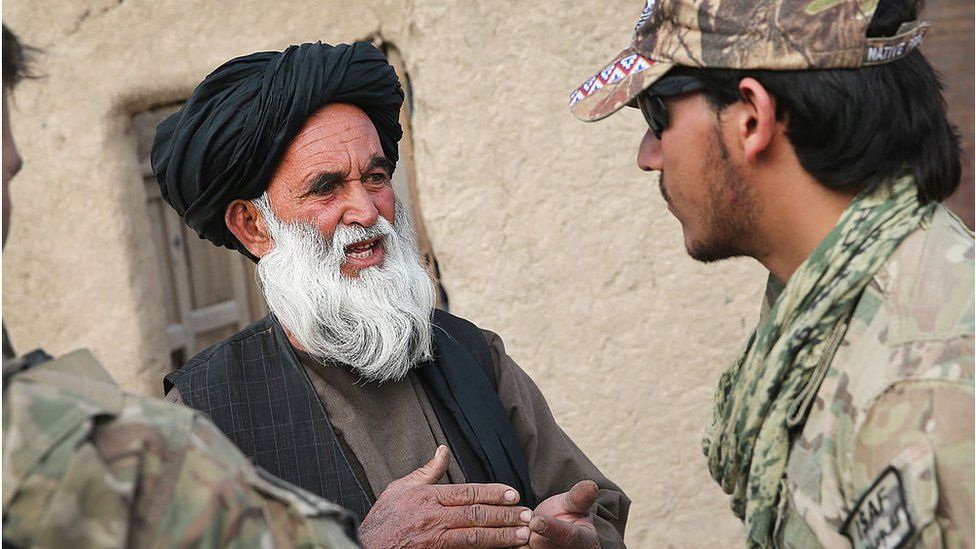
About 200 Afghan interpreters and their families have arrived in the US – the first of a group of 2,500 Afghans being evacuated as the Taliban advances.
The interpreters are being resettled under a visa programme for those who worked with the US during the recently ended 20-year war with the Taliban.
They arrived in the early hours of Friday morning and were taken to Fort Lee military base in Virginia.
They are expected to stay there for around a week while they are processed.
In a statement, US President Joe Biden called the arrivals “a milestone” and “the first of many” as US authorities work to relocate eligible Afghans out of harm’s way.
Afghans eligible for Special Immigrant Visas (SIV) will be transported either to the US, American facilities abroad or to third countries while they finish their applications. The most recent arrivals have already completed an extensive vetting process.
On Thursday, the US Senate approved more than $1bn (£719m) to pay for the evacuations, including housing and transportation.
The bill would also loosen applicant requirements and allow for 8,000 more visas in addition to the ones already allocated for.
The Taliban have been advancing Afghanistan following a decision by Mr Biden to withdraw the remaining American troops from the country.
With those advances have come danger to those who worked alongside US troops during the two-decade conflict.
Since 2008, approximately 70,000 Afghans have been resettled in the US on an SIV .
Last week, a senior state department official said that the total number of visa applicants now stands just over 20,000. About half have yet to complete the first steps of the process.
Those yet to go through the process face potential threats in attempting to secure a visa. Mike Jason, a former US Army battalion commander who was deployed to Afghanistan, told the BBC that travelling across Taliban-controlled areas with the documentation needed for SIVs puts interpreters in “mortal danger”.
“That’s basically an entire confession that you’re an interpreter working for the Americans. We’re asking them to travel with the evidence,” he said.
Not-for-profit group No One Left Behind estimates that at least 300 Afghans or their family members have been killed for working with the US.
The Taliban were removed from power by the US-led invasion in 2001, following the attacks on the World Trade Centre in New York.
Fighting between the insurgent Taliban and Afghan government forces has increased over the past two months as international troops pull out of the country.
July 31, 2021 Posted by intlxpatr | Afghanistan, Character, Community, Counter-terrorism, Cross Cultural, ExPat Life, Friends & Friendship, Leadership, Political Issues, Values, Work Related Issues | Leave a comment
“Keep it Superficial!”
AdventureMan grinned as he said it. He had just asked how we were doing, to which I replied “Fine!” We are both focused on projects that need doing but are neither stimulating nor particularly gratifying.
Have you ever noticed how long you can think about something, and then when you do it, it takes mere minutes, and you realize you’ve invested a lot of thought when you could have just done it and then not given it another thought?
When we bought this house, my thoughtful daughter-in-law left me paint cans for some of the rooms. In one bath, there was a line at the bottom of a wall that needed re-painting. It was such a tiny line, but it caught my eye every time I saw it and I resolved to fix it. And then I didn’t fix it.
So this morning, I found the right tiny paint brush, found the right piece of cardboard to shield where I don’t want the paint to go, gathered a little newspaper and moved some paint from the larger can to a smaller bottle. That took about as much time – maybe five minutes – as it took to also paint in the area that bothered me, and paint over places where time has bruised or nicked the paint, since I was working with that paint anyway. Total time – maybe ten minutes, maybe fifteen. A drop in the bucket, given all the times I had thought of doing it and didn’t do it.
There are things I just don’t really want to do, and it is so easy not to do them. AdventureMan is changing the cat litter; who ever WANTS to change cat litter? The joke in our house is that when I got pregnant, many years ago, I showed AdventureMan an article about some terrible thing that can happen if pregnant women handle cat litter, and it was around thirty years later when he asked me when I thought I might be able to scoop litter again.
While I am all about equality, there are some times when dividing up the labor makes sense to both of us. And then, there are tasks that you just do because they need doing. When he asks how I am doing, he doesn’t need to really know how I feel about painting a small line, and I don’t need to know his thoughts about the cat litter. it’s shorthand for “I love you; I care about you.” A “fine” will do.
June 10, 2021 Posted by intlxpatr | Aging, Character, Civility, Family Issues, Living Conditions, Pensacola, Quality of Life Issues, Relationships, Work Related Issues | Leave a comment
Exploiting Foreign Labor: Qatar and Kuwait
Living in Qatar and Kuwait was a life-changing experience. We loved the stimulation of living in an environment where little was as we expected it to be. The sights, sounds and colors were stronger, attention-getting, and learning to think in different ways kept us alive and young in ways we never anticipated.
There were also challenges. While as white Americans, we were high in the pecking order, we also realized we were high in a secondary category; there were the nationals, and there were all the others. We qualified, along with all the other imported labor, as others. We lived a great life, and we never forgot that we were “the other.” We were blessed with friends whose families had been living there long before our own country was even imagined. It gave a new perspective to our lives.
On the downside was the treatment of labor. Here are a couple of my own photos:

Traditional scaffolding

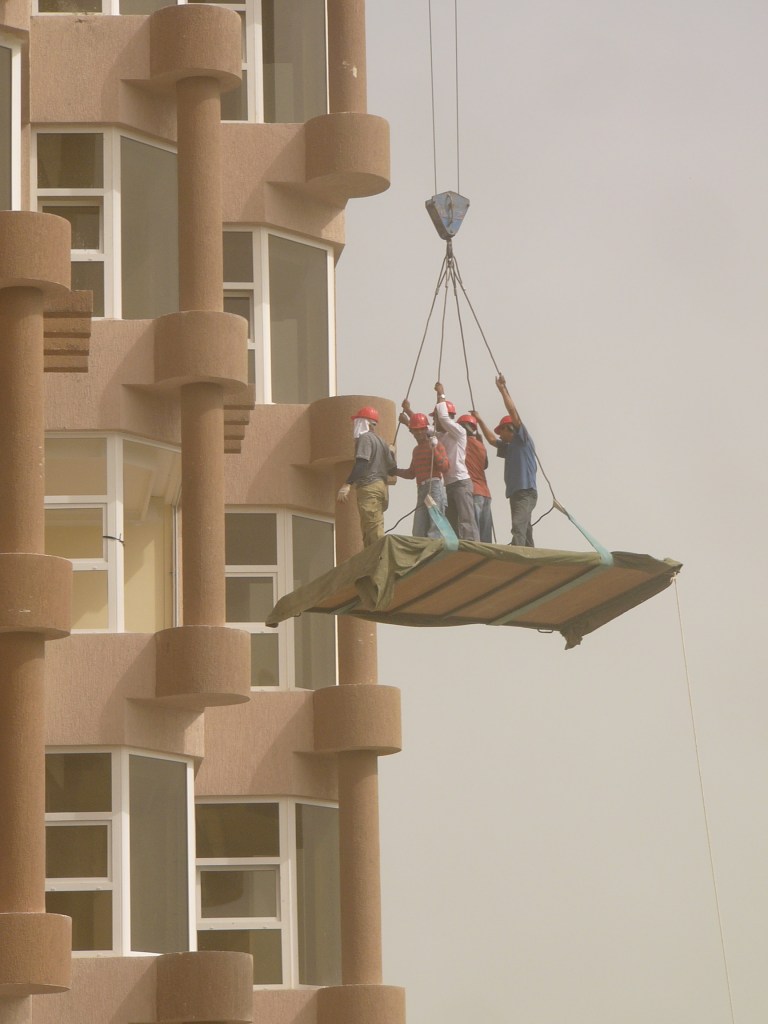

Working on a new building, these laborers are more than 12 stories up. There is no elevator, and this is their solution to accessing a location without climbing 12 stories in the 115 degree F. heat.
That breaks my heart is the statement that all these deaths are within the expected range. The laborers are treated with callous indifference. Most came hoping to provide their families with a better life, they lived in squalor and sent most of their salary beyond meager subsistence, back to their home countries. The employers held all the cards. They had a choice – take this terrible risk or go home.
I found this on AOL News and it said it was from Yahoo News.
Report: More than 6,500 migrant workers have died during Qatar’s World Cup prep
JASON OWENSFebruary 24, 2021, 11:34 PM
More than 6,500 migrant workers have died in Qatar amid the nation’s preparation to host the 2022 World Cup, The Guardian reports.
The report cites government data from the home nation of migrant workers including India, Pakistan, Nepal, Bangladesh and Sri Lanka. The data have been compiled since Qatar was awarded the World Cup in 2010, working out to an average of 12 deaths per week, according to the report.
FIFA awarded the World Cup to Qatar despite widespread concerns over human rights violations and treatment of migrant workers that have only been exacerbated since. Amnesty International has documented conditions of workers being “exploited” and “subjected to forced labor.”
“They can’t change jobs, they can’t leave the country, and they often wait months to get paid,” a report from the human rights organization states.
According to The Guardian, 2,711 workers from India, 1,641 from Nepal, 1,018 from Bangledesh, 824 from Pakistan and 557 from Sri Lanka have died working in Qatar since 2010. The Guardian estimates that the actual death toll of migrant workers is “considerably higher” since the data it cites is limited to the listed countries.
The nation with a population of less than 3 million is depending on 2 million migrant workers to build its labor force. The Philippines and Kenya are among other nations to send migrant workers to Qatar, according to the report.
The listed causes of death include electrocution, blunt injuries due to a fall from height and suicide. Most of the deaths are listed as “natural” while citing heart or respiratory failure.
Daytime temperatures in Qatar can approach 120 degrees during the summer. Normally played in the summer, Qatar’s World Cup will be held in November and December because of the oppressive heat.


Nick McGeehan of labor rights organization FairSquare Projects told The Guardian that World Cup construction accounts for much of the death toll
“A very significant proportion of the migrant workers who have died since 2011 were only in the country because Qatar won the right to host the World Cup,” he said.
Qatar has built or is building seven new stadiums in addition to significant infrastructure upgrades including roadways, hotels and an airport in preparation to host the World Cup. The opening and closing matches will be held at Lusail Iconic Stadium in Lusail, a city being built from the ground up ahead of the World Cup.
Qatar: Death toll within ‘expected range’
Qatar’s government didn’t dispute The Guardian’s findings and characterized the death toll as “expected” in a statement to publication.
“The mortality rate among these communities is within the expected range for the size and demographics of the population,” the statement read. “However, every lost life is a tragedy, and no effort is spared in trying to prevent every death in our country.”
FIFA also provided a statement to The Guardian.
“With the very stringent health and safety measures on site … the frequency of accidents on Fifa World Cup construction sites has been low when compared to other major construction projects around the world,” the statement reads, per The Guardian.
FIFA did not provide The Guardian with data to back up its claim.
According to Amnesty International, migrant workers seek employment in Qatar to escape poverty and unemployment at home. It describes dirty living conditions with eight workers living in a single room one they arrive. Workers are sometimes promised one salary only to be to be provided a lower wage once they arrive.
The group spoke to workers who paid anywhere from $500 to $4,300 in recruitment fees to agents that leave them in debt before they begin working in Qatar.
February 25, 2021 Posted by intlxpatr | Building, Circle of Life and Death, Cultural, ExPat Life, Financial Issues, Health Issues, Interconnected, Kuwait, Living Conditions, Qatar, Quality of Life Issues, Values, Work Related Issues | Leave a comment
USA: Democracy in Decline
On Sunday, the organist played “America the Beautiful” in a minor key. It reflected what many of us are experiencing. We love our country. We hate what we are seeing.
An excerpt from an article from the Washington Post about declining democracies in the world, this part focused on the USA, land that I love:
Democracy declined precipitously in the United States
The United States fell 24 places in the country ranking on liberal democracy over the past two years, from seventh in 2015 to 31st in 2017. When we compare the United States’ score in 2017 with its average score over the past 10 years, the drop is precipitous and unprecedented.
Experts lowered their estimates of democracy in the United States because they began to be skeptical that the U.S. Congress will rein in executive overreach. Similarly, experts lost faith that the opposition party can contribute to overseeing, investigating or otherwise checking the majority party. The U.S. executive branch was assessed as showing less respect for the Constitution and compliance with the judiciary, two indicators that the judicial branch can restrain the executive.
For all four indicators, the score for the United States declined. The downward trend in the United States is much worse than in other countries. In terms of government compliance with decisions of the Supreme Court, the United States used to rank among the top countries of the world — but has now declined to No. 48.
I remember living in Kuwait, self-censoring my blog entries so I wouldn’t be expelled from the country, even blogging under a pseudonym. I think of the ICE officer who resigned, and was visited by law enforcement as he gave an interview to national news explaining why he (and others) were quitting ICE, disgusted and disheartened by the un-American practices they were being forced to engage in to export “illegals.” Yes, we still have freedom of speech, but we also look over our shoulders, now, never sure what new low will strike next.
July 5, 2018 Posted by intlxpatr | Bureaucracy, Character, Civility, Cross Cultural, Cultural, Interconnected, Law and Order, Leadership, Living Conditions, Political Issues, Privacy, Quality of Life Issues, Social Issues, Values, Women's Issues, Work Related Issues | Democracy in decline | Leave a comment
Columbia Gorge Discovery Center and Museum
“She shows us the same things,” you might complain, and again I say “I write this blog for myself and for the love of writing about the things I love. You are welcome, all are welcome, and if you are not happy, you are welcome to go elsewhere!”
I’ve lived an odd life, a life I would’t trade with anyone. I grew up in Alaska, on an island with a lot of native Americans as my fellow students in my little elementary school. I grew up with Alaskan art, Indian artifacts, masks, baskets, and the hand made costumes, red and black images, sparked with trimming of white shirt buttons. I went to high school in Germany, traveling far and wide with my family or with friends through that continent, visiting more than a few churches and museums, even making special trips to see an exhibit or two.
Then a big change, life in the Middle East and Africa, where I learned to see things through a very different set of eyes and experiences, but something strange started happening, as I noted the differences, I could also see amazing similarities.
I love women’s handwork. I love the nomadic textiles, often made on very narrow looms that could be mostly a couple sticks and yarn from sheep or goats you’ve raised and slaughtered, died with whatever you could get your hands on. And, oddly, the weavings and patterns from Native American baskets and weavings have a lot in common with weavings from the Middle East, West Asia (the ‘Stans) and Africa. There is a love of working with black, white and red, for example, and a similarity to the structure of the animals, even when the animals themselves differ.
If you are interested in the work women do with their hands, you never lack for conversation wherever you go. There are always groups where women are teaching one another new techniques. I’ve met wonderful, creative women in Germany and in Kuwait and in Tunisia, all finding new and innovative ways to create, and also exploring preservation of early and ancient techniques.
So this Museum, the Columbia Gorge Discovery Center and Museum was richly rewarding for both AdventureMan and myself; it was rich in history, in interviews and movies showing early salmon runs, for example, and interviews with early Native Oregonians. It was also rich in exploring the techniques of early basket making and cooking techniques, preservation of salmon by drying and salting, etc. We spent hours in this museum, and we heartily recommend that you do, too 🙂 It is also a very gorgeous museum, rich in sensory impact, unforgettable.
I will show you pictures, and every now and then I will put in a little explanation.
Below is a dugout canoe, created from one very large cedar tree trunk, carved out by hand
There were really Direwolfs? GOT didn’t make them up?
Look at the motifs on these baskets! African? Azerbaijani? Kazakh? Kuwaiti?
For grinding chestnuts into paste, then the paste is cooked into a kind of meal like oatmeal. The morter and pestle is the same in so many places.
The round cooking stones, heated in fires, dropped into the meal, fished out once they start losing their heat, washed, reheated and put in again until the meal reaches a boil, all in this tightly woven basket.
Activity in the Children’s exploration area
We love the creativity and persistence of humans who preserve our heritage and traditions for future generations. It is particularly delightful when the preservation is in a museum conceived and manifested with beautiful elements and natural materials.
June 4, 2018 Posted by intlxpatr | Adventure, Afghanistan, Africa, Arts & Handicrafts, Beauty, Character, Cultural, Education, Entertainment, ExPat Life, Interconnected, Public Art, Quality of Life Issues, Road Trips, Travel, Values, Women's Issues, Work Related Issues | Leave a comment
-
Recent Posts
May 2024 S M T W T F S 1 2 3 4 5 6 7 8 9 10 11 12 13 14 15 16 17 18 19 20 21 22 23 24 25 26 27 28 29 30 31 Blog Stats
- 2,861,666 hits
Pages
Meta
Recent Comments
AA1C on Bravo, Kuwait! Miss Footloose on “NOOOO! Noooo! Not … intlxpatr on Revisiting Old Haunts and The… Doug Root on Revisiting Old Haunts and The… Cathy on Demise of Errant AirTag Wikipedia Donate Button
Amazina
Early Voting in Florida

Archives
- April 2024
- December 2023
- November 2023
- September 2023
- August 2023
- July 2023
- May 2023
- April 2023
- March 2023
- February 2023
- January 2023
- December 2022
- October 2022
- September 2022
- July 2022
- June 2022
- May 2022
- April 2022
- March 2022
- February 2022
- December 2021
- October 2021
- September 2021
- August 2021
- July 2021
- June 2021
- May 2021
- April 2021
- March 2021
- February 2021
- January 2021
- December 2020
- November 2020
- October 2020
- September 2020
- August 2020
- July 2020
- June 2020
- May 2020
- March 2020
- February 2020
- January 2020
- December 2019
- October 2019
- September 2019
- August 2019
- July 2019
- June 2019
- April 2019
- March 2019
- November 2018
- October 2018
- September 2018
- August 2018
- July 2018
- June 2018
- May 2018
- April 2018
- February 2018
- January 2018
- December 2017
- October 2017
- September 2017
- August 2017
- July 2017
- June 2017
- May 2017
- March 2017
- February 2017
- January 2017
- December 2016
- November 2016
- October 2016
- September 2016
- August 2016
- July 2016
- June 2016
- May 2016
- April 2016
- March 2016
- February 2016
- January 2016
- December 2015
- November 2015
- October 2015
- September 2015
- August 2015
- July 2015
- June 2015
- May 2015
- April 2015
- March 2015
- February 2015
- January 2015
- December 2014
- November 2014
- October 2014
- September 2014
- August 2014
- July 2014
- June 2014
- May 2014
- April 2014
- March 2014
- February 2014
- January 2014
- December 2013
- November 2013
- October 2013
- September 2013
- August 2013
- July 2013
- June 2013
- May 2013
- April 2013
- March 2013
- February 2013
- January 2013
- December 2012
- November 2012
- October 2012
- September 2012
- August 2012
- July 2012
- June 2012
- May 2012
- April 2012
- March 2012
- February 2012
- January 2012
- December 2011
- November 2011
- October 2011
- September 2011
- August 2011
- July 2011
- June 2011
- May 2011
- April 2011
- March 2011
- February 2011
- January 2011
- December 2010
- November 2010
- October 2010
- September 2010
- August 2010
- July 2010
- June 2010
- May 2010
- April 2010
- March 2010
- February 2010
- January 2010
- December 2009
- November 2009
- October 2009
- September 2009
- August 2009
- July 2009
- June 2009
- May 2009
- April 2009
- March 2009
- February 2009
- January 2009
- December 2008
- November 2008
- October 2008
- September 2008
- August 2008
- July 2008
- June 2008
- May 2008
- April 2008
- March 2008
- February 2008
- January 2008
- December 2007
- November 2007
- October 2007
- September 2007
- August 2007
- July 2007
- June 2007
- May 2007
- April 2007
- March 2007
- February 2007
- January 2007
- December 2006
- November 2006
- October 2006
- September 2006
Catagories
- Advent
- Adventure
- Afghanistan
- Africa
- Aging
- Air France
- AirTag
- Alaska
- Arts & Handicrafts
- Beauty
- Biography
- Birds
- Blogging
- Blogroll
- Books
- Botswana
- Building
- Bureaucracy
- Character
- Charity
- Chocolate
- Christmas
- Circle of Life and Death
- Civility
- Climate Change
- Cold Drinks
- color
- Communication
- Community
- Cooking
- Counter-terrorism
- Crime
- Cross Cultural
- Cultural
- Customer Service
- Detective/Mystery
- Dharfur
- Diet / Weight Loss
- Doha
- Easter
- Eating Out
- Education
- Eid
- Entertainment
- Entrepreneur
- Environment
- EPIC Book Club
- Events
- Exercise
- ExPat Life
- Experiment
- Faith
- Family Issues
- Fiction
- Financial Issues
- Fitness / FitBit
- Florida
- Food
- France
- fraud
- Free Speech
- Friends & Friendship
- Fund Raising
- Gardens
- Generational
- Geography / Maps
- Germany
- GoogleEarth
- Gulf Coast Citizen Diplomacy Council
- Halloween
- Health Issues
- Heritage
- History
- Holiday
- Home Improvements
- Hot drinks
- Hotels
- Humor
- Hurricanes
- Hygiene
- India
- Interconnected
- iPhone
- Iran
- Ireland
- Italy
- Joke
- Jordan
- Just Bad English
- Kenya
- KLM
- Kuwait
- Language
- Law and Order
- Leadership
- Lectionary Readings
- Lent
- Lies
- Living Conditions
- Local Lore
- Locard Exchange Principal
- Lumix
- Mardi Gras
- Marketing
- Marriage
- Mating Behavior
- Middle East
- Money Management
- Morocco
- Movie
- Moving
- Music
- New Orleans
- News
- Nigeria
- NonFiction
- Oman
- Pakistan
- Parenting
- Paris
- Pensacola
- Pet Peeves
- Pets
- Photos
- Poetry/Literature
- Political Issues
- Privacy
- Public Art
- Qatar
- Qatteri Cat
- Quality of Life Issues
- Ramadan
- Random Musings
- Rants
- Recipes
- Relationships
- Renovations
- Restaurant
- Road Trips
- Safety
- Satire
- Saudi Arabia
- Scams
- Seattle
- Shopping
- Social Issues
- South Africa
- South Sudan
- Spiritual
- Statistics
- Stranger in a Strange Land
- Sudan
- sunrise series
- Sunsets
- Survival
- Tag
- Tanzania
- Technical Issue
- Thanksgiving
- Tibet
- Tools
- Transparency
- Travel
- Tunisia
- Turkey
- Uncategorized
- Values
- Venice
- Weather
- Wildlife
- Women's Issues
- WordPress
- Words
- Work Related Issues
- YMCA
- Zakat
- Zambia
- Zanzibar
- Zimbabwe
Blogroll
- A.Word.A.Day
- Global Incident Map
- Global Voices Online � Kuwait
- Google Earth
- Google Earth Blog
- John Lockerbie Gulf design
- Kuwait Paper Dump
- National Public Radio
- Ogle Earth
- Operation Hope – Kuwait
- Robin Pope Safaris Zambia
- the Journey: Kisses From Katie
- The Lectionary
- Weather Underground
- Wind Map
- WordPress.com
- WordPress.org

